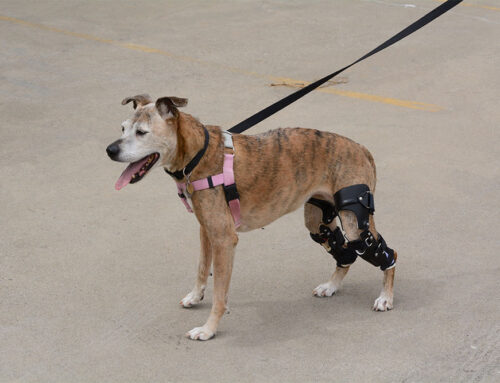Facing the Final Days: A Compassionate Guide for Pet Owners
The joy of sharing life with pets is measured in everyday moments- tail wags at the door, midnight cat zoomies, or quiet mornings curled up together. But as pets age or face serious illness, families may begin to notice changes: the dog who once leapt into the car now hesitates, or the cat who used to scale cabinets prefers to nap on the floor. These subtle shifts often signal advancing disease or chronic pain, and eventually families must face the heartbreaking question of how to best support their companion’s final chapter.
At Livingston Veterinary Hospital, our mission is to guide families with clarity, empathy, and comprehensive medical care. From advanced diagnostics and pain management to compassionate end-of-life support, our team walks beside you- helping each pet remain comfortable and each family feel supported.
What Is End-of-Life and Palliative Care?
End-of-life or hospice care prioritizes comfort and dignity rather than cure. It may include pain control, nutritional support, mobility aids, and emotional guidance for families. Choosing palliative care is not about “giving up”- it’s about giving more: more good days, more meaningful moments, and more peace for both pets and people.
Learn more about the basics of end-of-life care and why this compassionate philosophy is an important part of veterinary medicine.
Why Planning Matters
End-of-life planning ensures pets avoid unmanaged pain and families avoid rushed decisions. Key considerations can help guide discussions with your veterinarian:
- For pets: Pain and anxiety remain controlled, daily routines stay familiar, and dignity is preserved.
- For families: Clear goals, financial expectations, and emotional readiness replace uncertainty and fear.
At Livingston Veterinary Hospital, we use a “whole-istic” 360° approach- considering your pet’s age, body condition, lifestyle, and exposure risks. This perspective allows us to shift smoothly from curative medicine to comfort care when the time is right.
Conditions That Often Lead to Hospice Care
End-of-life care may be appropriate for pets facing:
- Cancer that no longer responds to surgery, chemotherapy, or medication.
- Organ failure such as chronic kidney disease, congestive heart failure, or liver insufficiency.
- Severe arthritis or mobility loss, even when medications and supplements no longer restore comfort. Assistive devices for dogs with arthritis may help, but advanced disease may still limit mobility.
- Neurological decline, including cognitive dysfunction, which mirrors dementia in humans.
- Traumatic injury with poor prognosis, when the goal shifts from cure to comfort.
Our Senior Wellness Exams and Questionnaires help identify these issues early, making transitions smoother and less stressful for families.
Measuring Quality of Life
Families often ask: “How will I know when it’s time?” Because good days and bad days blur together, structured tools provide clarity.
- The AWI quality-of-life scale tracks daily patterns in appetite, mobility, hydration, comfort, and happiness.
- AAHA’s pain sign resource helps owners recognize when subtle signs actually signal significant suffering.
- Cats are especially skilled at hiding illness. The Feline Grimace Scale is a validated tool veterinarians use to detect pain through changes in facial expression.
By recording observations at home and sharing them with our team, families gain confidence in making timely, compassionate decisions.
How Our Veterinary Team Helps
At Livingston Veterinary Hospital, our end-of-life care includes a full partnership with families:
- Physical exams to assess pain, hydration, and muscle tone.
- Advanced diagnostics such as bloodwork, ultrasound, or X-rays to guide comfort measures- not to pursue aggressive cures, but to support safety and well-being.
- Medication review and adjustments for effectiveness and safety.
- Family-centered discussions that align care with your values and your pet’s comfort.
Our team also collaborates with internal medicine, orthopedic, and radiology specialists across Montana and beyond for complex cases- ensuring each plan is informed by the most current expertise.
Pain Management and Supportive Therapies
Comfort is the cornerstone of hospice.
Medical Therapies
- NSAIDs and opioids to reduce pain and inflammation.
- Adjunctive medications such as gabapentin or amantadine for nerve pain.
- Appetite stimulants and nutrient-dense diets to help maintain strength.
- Subcutaneous fluids for pets with kidney disease to prevent dehydration.
- Joint-modifying injections and chemotherapy, when appropriate, to ease pain or slow progression of disease.
Supportive and Alternative Therapies
Livingston Veterinary Hospital also offers holistic options to complement medical therapy:
- Acupuncture to stimulate nerves and release natural endorphins
- Animal chiropractic care to restore mobility and alignment.
- Class IV laser therapy to reduce inflammation and promote healing
- Massage therapy to ease tension and support relaxation
This integrative approach reflects our hospital’s philosophy: blending science and compassion to support each pet’s unique journey.
Keeping Pets Comfortable at Home
Many changes can be made at home to extend comfort and independence:
- Provide supportive, orthopedic bedding in quiet resting spots.
- Use ramps, slings, or harnesses to make movement easier.
- Add rugs or mats to prevent slips on smooth floors.
- Elevate food and water dishes for easier access.
- Maintain grooming and hygiene to prevent skin issues.
Arthritis-friendly home adjustments can make an enormous difference in your pet’s day to day comfort and safety.
When Euthanasia Becomes the Kindest Option
Despite the best efforts, there comes a point when comfort measures cannot prevent suffering. Choosing euthanasia is one of the hardest but most loving decisions a family can make.
- The process: Sedation ensures deep relaxation before a peaceful, pain-free passing.
- Family choice: You may choose to stay with your pet; our private, calm environment is designed to honor this moment.
- Aftercare: Cremation and memorial keepsakes are available, and we guide families through each option with sensitivity.
Coping with Loss
The grief of losing a pet is profound. Resources like Cornell’s Pet Loss Support and the Association for Pet Loss and Bereavement offer counseling, hotlines, and moderated support groups.
Including children in gentle caregiving or remembrance activities often helps them process grief in healthy ways. Reading together, planting a memorial tree, or creating a photo book can transform sadness into tribute.
Why Families Trust Livingston Veterinary Hospital
- Whole-istic 360° care that considers every factor in your pet’s health and lifestyle.
- Advanced medical expertise with early detection, diagnostics, and surgery.
- Compassionate culture centered on empathy, family partnership, and respect for the human-animal bond.
- Flexible support with ScratchPay and Care Credit financing to ensure comfort care is never out of reach.
Meet the compassionate team who dedicate their skills to helping pets live well at every stage of life.
A Loving Goodbye
Saying goodbye is never easy, but it can be loving, peaceful, and filled with dignity. At Livingston Veterinary Hospital, we are here to help families through this transition with clarity, compassion, and unwavering medical support.
Livingston Veterinary Hospital – Livingston, MT
(406) 222-6823
Contact us to schedule a hospice consultation or to ask questions about end-of-life care.
Together, we can ensure your pet’s final days are spent surrounded by comfort, love, and the family they cherish most.








Leave A Comment